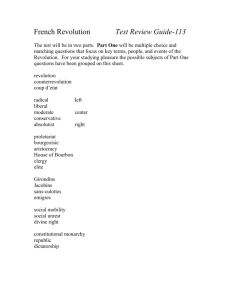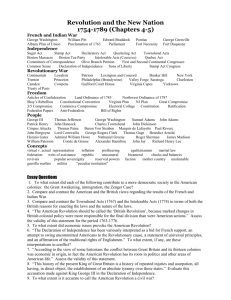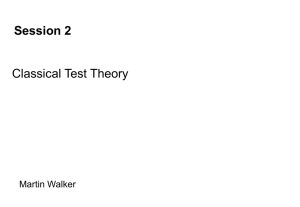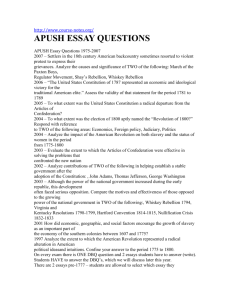DBQQuestionBank.doc
advertisement
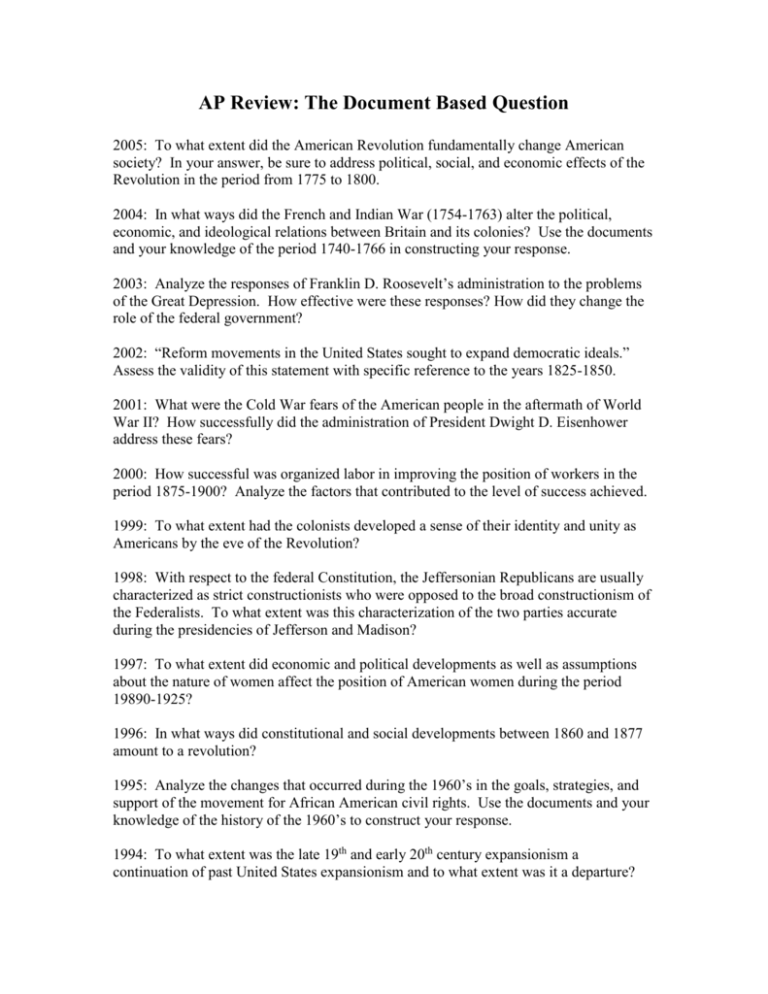
AP Review: The Document Based Question 2005: To what extent did the American Revolution fundamentally change American society? In your answer, be sure to address political, social, and economic effects of the Revolution in the period from 1775 to 1800. 2004: In what ways did the French and Indian War (1754-1763) alter the political, economic, and ideological relations between Britain and its colonies? Use the documents and your knowledge of the period 1740-1766 in constructing your response. 2003: Analyze the responses of Franklin D. Roosevelt’s administration to the problems of the Great Depression. How effective were these responses? How did they change the role of the federal government? 2002: “Reform movements in the United States sought to expand democratic ideals.” Assess the validity of this statement with specific reference to the years 1825-1850. 2001: What were the Cold War fears of the American people in the aftermath of World War II? How successfully did the administration of President Dwight D. Eisenhower address these fears? 2000: How successful was organized labor in improving the position of workers in the period 1875-1900? Analyze the factors that contributed to the level of success achieved. 1999: To what extent had the colonists developed a sense of their identity and unity as Americans by the eve of the Revolution? 1998: With respect to the federal Constitution, the Jeffersonian Republicans are usually characterized as strict constructionists who were opposed to the broad constructionism of the Federalists. To what extent was this characterization of the two parties accurate during the presidencies of Jefferson and Madison? 1997: To what extent did economic and political developments as well as assumptions about the nature of women affect the position of American women during the period 19890-1925? 1996: In what ways did constitutional and social developments between 1860 and 1877 amount to a revolution? 1995: Analyze the changes that occurred during the 1960’s in the goals, strategies, and support of the movement for African American civil rights. Use the documents and your knowledge of the history of the 1960’s to construct your response. 1994: To what extent was the late 19th and early 20th century expansionism a continuation of past United States expansionism and to what extent was it a departure? Use the documents and your knowledge of United States history to 1914 to construct your answer. 1993: Although New England and the Chesapeake region were both settled largely by people of English origin, by 1700 the regions had evolved into two distinct societies. Why did this difference in development occur? Use both evidence from the documents and your knowledge of the colonial period up to 1700 to develop your answer. 1992: To what extent did the natural environment shape the development of the West beyond the Mississippi and the lives of those who settled there? How important were other factors? Use both evidence from the documents and your knowledge of the period from the 1840’s to 1890’s to compose your answer. 1991: “It was the strength of the opposition forces, both liberal and conservative, rather than the ineptitude and stubbornness of President Wilson that led to the Senate defeat of the Treaty of Versailles.” Using the documents and your knowledge of the period 19171921, assess the validity of this statement. 1990: Jacksonian Democrats viewed themselves as guardians of the United States Constitution, political democracy, individual liberty, and equality of economic opportunity. In light of the documents and your knowledge of the period 1820-1840, to what extent do you agree with the Jacksonians’ view of themselves? 1989: Booker T. Washington and W.E.B. DuBois offered different strategies for dealing with the problems of poverty and discrimination faced by Black Americans at the end of the nineteenth and beginning of the twentieth centuries. Using the documents and your knowledge of the period 1877-1915, assess the appropriateness of each of these strategies in the historical context in which each was developed. 1988: The United States decision to drop an atomic bomb on Hiroshima was a diplomatic measure calculated to intimidate the Soviet Union in the post-World War II era rather than a strictly military measure designed to force Japan’s unconditional surrender. Evaluate this statement using the documents and your knowledge of the military and diplomatic history of the years 1939-1947. 1987: “By the 1850’s, the Constitution, originally framed as an instrument of national unity, had become a source of sectional discord and tension and ultimately contributed to the failure of the union it had created.” Using the documents and your knowledge of the period 1850-1861, assess the validity of this statement. 1986: The 1920’s were a period of tension between new and changing attitudes on the one hand and traditional values and nostalgia on the other. What led to the tension between old and new AND in what ways was the tension manifested? 1985: “From 1781 to 1789 the Articles of Confederation provided the United States with an effective government.” Using the documents and your knowledge of the period, evaluate this statement. 1984: President Franklin Roosevelt is commonly thought of as a liberal and President Herbert C. Hoover as a conservative. To what extent are these characterizations valid? 1983: Documents A-H reveal some of the problems that many of the farmers in the late 19th Century (1880-1900) saw as threats to their way of life. Using the documents and your knowledge of the period, (a) explain the reasons for agrarian discontent and (b) evaluate the validity of the farmers’ complaints. 1982: John Brown’s raid on the federal armory at Harper’s Ferry, Virginia, in October 1859, involved only a handful of abolitionists, freed no slaves, and was over in two days. Although many Northerners condemned the raid, by 1863 John Brown had become a hero and martyr in the North. To what extent do the views expressed in the documents illustrate changing North-South relations between 1859 and 1863?


